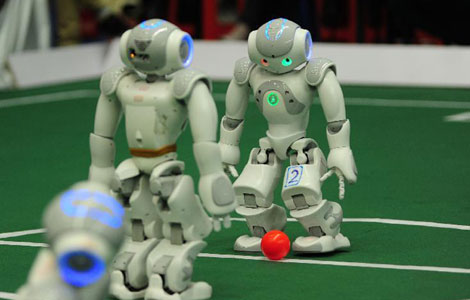Not all works of animations good for kids
Updated: 2013-10-22 08:11
By Xiao Lixin (China Daily)
|
|||||||||||
It is difficult to find a child in China that doesn't watch the Pleasant Goat and Big Big Wolf, because the TV cartoon series about a large goat family on "Qingqing Pasture" and a clumsy wolf trying in vain to eat them is telecast on almost all satellite TV channels. Soon after debuting in 2005, the cartoon series became a favorite with children. Considered a success story for domestic animation, it grabbed quite a substantial share of the film market during the especially competitive Spring Festival.
But some of the harmful contents in popular domestic animations have created a controversy and sparked a public debate. Many say the story lines in these cartoon series are too intricate for children to follow and the violent scenes could be detrimental to their healthy development. Worse, some children have tried to imitate some scenes from the animations in real life leading to tragedy. Among the animations on the controversy list are the Pleasant Goat and Big Big Wolf and The Bear is Coming.
Earlier this year, a 5-year-old boy and his eight-year-old brother in Lianyungang, Jiangsu province, suffered severe burns when their 9-year-old friend tried to play out a scene from the Pleasant Goat and Big Big Wolf. Similar tragic incidents have been reported from other areas. So it is little wonder that earlier this month, Xinwen lianbo, the most watched news program on China Central Television, blamed TV cartoon films for the tragedies.
Internet users were quick to react to the criticism, sparking an online debate with some of them urging the government to adopt a rating system to protect children from the harms of violent cartoon films.
Some countries have clear-cut ratings for animations, classifying them for different age groups. Japan, for instance, not only classifies animations in terms of age groups, but also has regulations for selling and lending of animation DVDs and telecasting cartoon films on TV at different periods of the day to suit the viewing times of children of different ages. Also, labels on all animation products give detailed information on, among other things, which ones require parental guidance.
There is a misconception among Chinese people that cartoons are only for children. The truth is that animations for adults take up a significant part of the market both at home and abroad. For example, popular Japanese cartoon series Crayon Shin-chan is actually tailored for young adults and, according to a Japan Parent-Teacher Association survey, more than 50 percent Japanese parents have made it clear they don't want their children to watch it. But in China, Crayon Shin-chan is watched by adults, young adults and children alike.
Animations are supposed to help children learn more about the world. But the ability to distinguish right from wrong varies among children of different ages, so when they are exposed to cartoons with contents and story lines beyond their understanding, they are likely to be affected in some way or the other by them. And children's inborn curiosity and talent of imitating others, whether real or virtual, prompts them to copy whatever they see on screen.
To keep children away from violent and pornographic elements, not only does China need a rating system for animations, but also has to adopt measures to make animation makers and TV stations fulfill their social responsibility by classifying their animations' contents according to age groups. Parents, too, have the obligation to decide whether a cartoon series is good enough for their children rather than using them randomly to placate their crying or naughty children. To do that, parents obviously have to watch the cartoon films first.
At a time when the cartoon and film market is in chaos because of lack of a rating system, family is the last defense for children. Parents, especially parents of preschool children, should be more careful with what they allow their children to watch and read. Also, parents have to decide which animations are good for their children and tell them in advance how much time they should spend on animations each day. Moreover, parents should spend as much time as possible with their children and guide them on cartoon films.
The author is a reporter with China Daily. xiaolixin@chinadaily.com.cn
(China Daily 10/22/2013 page8)
Today's Top News
UK official looks to China for support
Economy to see 'good ending'
Teacher killed in US school shooting
Border agreement to boost ties
US OKs Alibaba structure
Beijing works to spur global development
Scientists requested government to plant GM crops
Travelers to Europe bypass attractions of Brussels
Hot Topics
Lunar probe , China growth forecasts, Emission rules get tougher, China seen through 'colored lens', International board,
Editor's Picks

|

|

|

|

|

|





